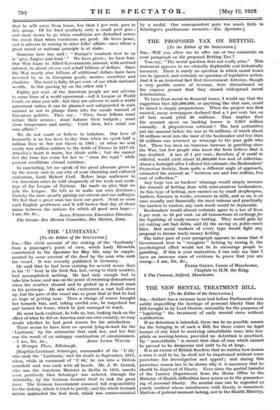THE PROPOSED TAX ON BETTING.
[To the Editor of the. SPECTATOR.] SIR,—Wili you allow me to offer one or two comments on your paragraph on the proposed Betting Tax ?
You say, " The moral question doei not really arise." This statement appears to me ethically deplorable and historically incorrect. There is surely no question in which moral issues can be ignored, and certainly no question of legislative action. And it is an historical fact that Government lotteries, though . a very prolific source of revenue, were discontinued on the express ground that they caused widespread moral deterioration.
To turn from moral to financial issues, I would say that the suggestion that £20,000,000, or anything like that sum, could be raised is simply preposterous. When the project was first mooted, many newspapers declared that a 1 per cent. tax on all bets would yield 20 millions. That implies that the amount spent on backing horses is 2,000 million
annually. A preposterous estimate ! The best authorities put the amount before the war at 70 millions, of which about 50 millions went into the maw of the bookmaker and less than 20 millions was returned as winnings to the poor gulls who bet. There has been an immense increase in gambling since the War, but few people who know the facts believe that it has doubled. A tax of 1 per cent., therefore, if it could be collected, would yield about £1,400,000 less eost of collection. About a fortnight after I offered this estimate, the Bookmakers' Protection Society, from quite a different angle of approach, estimated the amount as " between one and two million, less cost of collection."
Any large tax on backers' winnings would simply increase the amount of betting done with semi-amateur bookmakers. As this type of betting, now carried on by small shopkeepers, barbers, foremen in works, overseers in mills, and so on, is at once morally and financially the most ruinous and practically the hardest to control, any such result would be deplorable. .
Bookmakers would almost certainly agree to a tax of from 5 per cent. to 10 per cent. on all transactions in exchange for the legalizing of ready-money betting. They would gain by (a) cutting out bad debts, and (b) the saving on police-court fines. But social workers of every type would fight any proposal to license ready-money betting.
The latter part of your paragraph appears to mean that if Government were to " recognize " betting by taxing it, the psychological effect would not be . to encourage people to gambling. If this is your contention, I can only say that I have an immense mass of evidence to prove that you are wrong.—I am, Sir, &c.,
6 The Crescent, Salford, Manchester.


















































 Previous page
Previous page